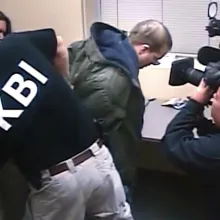David Osit discusses how Predators, his house of cards examining Chris Hansen’s controversial sting show and its YouTube imitators, stealthily
True Crime Docs
I have been producing projects with director Dylan Sires since 2017. Our latest project, 'ChiefsAholic: A Wolf in Chiefs Clothing' (2024), is an Amazon Original documentary about Kansas City Chiefs superfan Xaviar Babudar, aka “ChiefsAholic,” who rose to fame with his social media antics. But a secret life came to light when he was arrested, unraveling a series of unsolved bank robberies committed across the Midwest. ChiefsAholic was the first time we were given money to develop something—US$60,000, in fact. That only covered two weeks to capture enough of the story that we could use to sell. It was naive of us to think that having a budget made things any easier. At the time of writing, 'ChiefsAholic' carried a U.S. number one position on Amazon Prime for four days and generated a wild response from true crime fanatics and Chiefs Kingdom.
Prolific documentary essayist Charlie Shackleton’s latest film focuses on one of America’s most notorious criminals, the Zodiac Killer. Or rather, it’s a film about the documentary he would’ve made about the serial killer, had he been able to secure the rights to California Highway Patrol Officer Lyndon E. Lafferty’s 2012 true-crime book, The Zodiac Killer Cover-Up. As he describes the project that didn’t materialize, Shackleton pokes fun at the tropes that have come to define modern true crime shows. For Documentary, Shackleton spoke about weighing art against artifice and the ethical considerations of true crime.
To Catch a Predator (2004–2007), a periodic segment on the TV newsmagazine Dateline NBC, was one of the biggest nonfiction sensations of the 2000s. The new documentary Predators, recently premiered at the Sundance Film Festival, examines this and other ethical issues around the program. In particular, the film scrutinizes the host of copycat media operations that have arisen over the years, as well as the show’s broader influence on the true crime genre. Ahead of the premiere, we sat down with director David Osit over Zoom to discuss To Catch a Predator and its modern fan community, finding all the materials used in Predators, and the delicate balancing act involved in incorporating so much raw footage.

Editor’s Note: A previous version of this story contained a misquote that improperly identified the film’s editors. Post-production on The Lovers and








